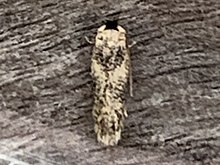| Zimmermannia bosquella | |
|---|---|

| |
| Conservation status | |
 Unrankable (NatureServe) | |
| Scientific classification | |
| Domain: | Eukaryota |
| Kingdom: | Animalia |
| Phylum: | Arthropoda |
| Class: | Insecta |
| Order: | Lepidoptera |
| Family: | Nepticulidae |
| Genus: | Zimmermannia |
| Species: | Z. bosquella |
| Binomial name | |
| Zimmermannia bosquella (Chambers, 1878) | |
| Synonyms | |
| |
Zimmermannia bosquella is a moth of the family Nepticulidae. It is found in Virginia, Ohio, and Kentucky in the United States. It is now classified as conspecific with the American chestnut moth, which was formerly considered as extinct.
Description
The wingspan is 9–10 mm. The larvae are full grown in October and early November, producing adults in May and June of the following year.
Behaviour and ecology
The larvae feed on Quercus palustris. They mine the leaves of their host plant.
The moth's synergistic relationship with the North American nut species led to a catastrophic population decline when almost all of the American chestnut trees fell victim to chestnut blight. The American chestnut tree was driven almost to extinction, and the American chestnut moth was thought to be extinct. The American chestnut tree moth was later found to still be extant within populations of Zimmermannia bosquella.
References
- "NatureServe Explorer 2.0". explorer.natureserve.org. Retrieved 7 October 2022.
- World Conservation Monitoring Centre. 2018. Ectoedemia castaneae (amended version of 1996 assessment). The IUCN Red List of Threatened Species 2018: e.T7028A134978019. doi:10.2305/IUCN.UK.2018-2.RLTS.T7028A134978019.en. Downloaded on 05 August 2020.
- Opler, P. A. (1978, January). Insects of American chestnut: possible importance and conservation concern. In The American chestnut symposium (pp. 83-85). Morgantown, West Virginia: West Virginia University Press.
- Thompson, H. (2012). The chestnut resurrection. Nature, 490(7418), 22.
- Nieukerken, Erik van; Doorenweerd, Camiel; Hoare, Robert; Davis, Donald (2016-10-31). "Revised classification and catalogue of global Nepticulidae and Opostegidae (Lepidoptera, Nepticuloidea)". ZooKeys (628): 65–246. Bibcode:2016ZooK..628...65V. doi:10.3897/zookeys.628.9799. ISSN 1313-2970. PMC 5126388. PMID 27917038.
External links
| Taxon identifiers | |
|---|---|
| Ectoedemia castaneae | |
| Ectoedemia heinrichi | |
This article on a moth of the Ectoedemia genus is a stub. You can help Misplaced Pages by expanding it. |